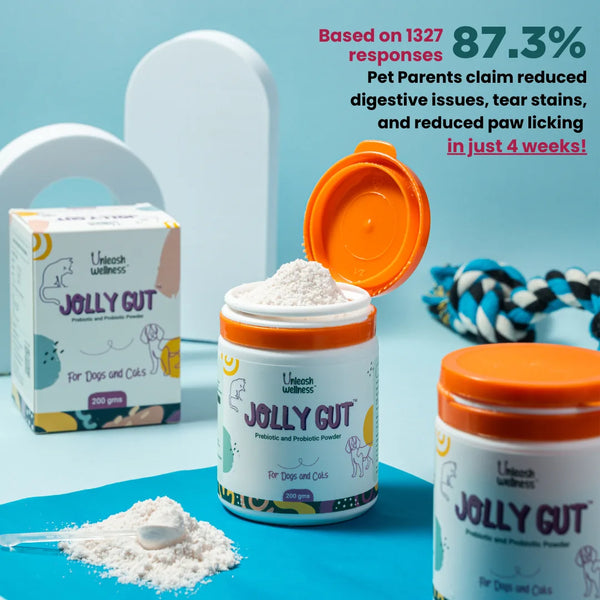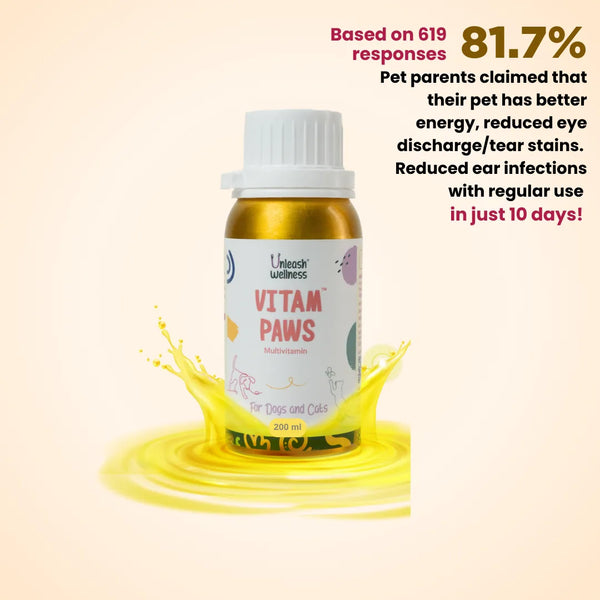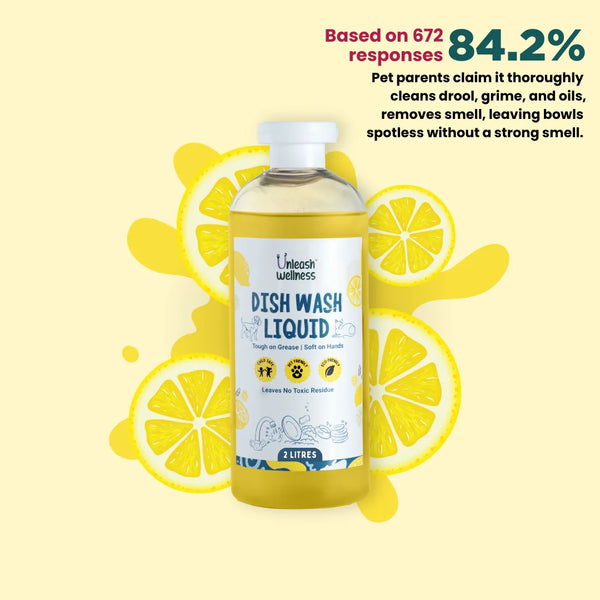Introduction
Digestive health problems affect nearly 70% of dogs in urban India, yet many pet parents remain unaware of the revolutionary solution hiding in their dog's food bowl. Recent veterinary research reveals that incorporating beneficial bacteria into your dog's diet can transform their gut health, boost immunity, and even support weight management. Probiotic dog food represents a scientifically-backed approach to canine wellness that's gaining recognition among Indian veterinarians and pet owners alike.
Modern dogs face unique challenges – from processed diets to antibiotic treatments – that disrupt their natural gut microbiome. This bacterial imbalance often manifests as digestive issues, weakened immunity, and behavioral changes. Understanding how probiotic-enriched nutrition works can help you make informed decisions about your dog's health and wellbeing.
What is Probiotic Dog Food and How Does It Work
Understanding Probiotic Strains in Dog Nutrition
Probiotic dog food contains live beneficial bacteria specifically selected to support canine digestive health. These microscopic organisms work by colonizing your dog's intestinal tract, where they compete with harmful bacteria for resources and space. The most effective formulations combine multiple strains to target different aspects of gut health.
Research demonstrates remarkable results with specific strain combinations. A clinical study involving Lactiplantibacillus plantarum and Bifidobacterium breve showed significant weight loss and improved lipid metabolism in obese dogs over just 12 weeks. This highlights how targeted probiotic strains can address multiple health concerns simultaneously.
Different bacterial strains offer unique benefits. Lactobacillus species excel at producing digestive enzymes, while Bifidobacterium strains support immune function. The key lies in selecting products that specify strain names rather than generic "probiotic blend" labels.
The Science Behind Gut Microbiome Balance in Dogs
Your dog's gut microbiome functions as a complex ecosystem containing trillions of microorganisms. When healthy, this system maintains digestive efficiency, produces essential nutrients, and regulates immune responses. However, stress, poor diet, or medications can disrupt this delicate balance.
Probiotics work by restoring microbial diversity and strengthening intestinal barriers. Clinical evidence shows that probiotics normalize intestinal dysbiosis and increase tight junction proteins in dogs with inflammatory bowel disease. These tight junctions prevent harmful substances from entering the bloodstream while allowing beneficial nutrients to pass through.
The restoration process typically takes 2-4 weeks of consistent probiotic intake. During this period, beneficial bacteria establish colonies, crowd out pathogens, and begin producing short-chain fatty acids that nourish intestinal cells. This creates a self-sustaining cycle of improved gut health.
Top Health Benefits of Probiotic Dog Food
Improved Digestive Health and Reduced Stomach Issues
Digestive problems represent the primary reason pet owners seek probiotic solutions. These beneficial bacteria address multiple gastrointestinal concerns by supporting natural digestive processes and reducing inflammation throughout the intestinal tract.
Clinical research provides compelling evidence for digestive benefits. Studies demonstrate that probiotics reduce diarrhea duration by 30% in dogs with gastroenteritis, offering rapid relief from acute symptoms. This reduction occurs because probiotics help restore normal gut motility and water absorption.
Regular probiotic supplementation also prevents recurring digestive issues. Dogs receiving consistent probiotic support show improved stool consistency, reduced gas production, and better nutrient absorption. These improvements often become noticeable within the first week of starting a quality probiotic regimen.
Enhanced Immune System Function and Disease Resistance
The connection between gut health and immunity extends far beyond basic digestion. Approximately 70% of your dog's immune system resides in the intestinal tract, making gut health crucial for overall disease resistance and wellness.
Probiotic bacteria support immune function through multiple mechanisms. They stimulate the production of protective antibodies, enhance white blood cell activity, and maintain the gut barrier that prevents pathogen invasion. Additionally, research shows that Bifidobacterium strains improve gut-brain axis functioning, reducing stress-related behaviors that can compromise immune health.
Regular probiotic intake helps dogs recover faster from minor illnesses and reduces the frequency of digestive upsets. Pet owners often report fewer emergency vet visits and improved energy levels in dogs receiving consistent probiotic support through their daily nutrition.
Weight Management and Metabolic Support
Emerging research reveals promising connections between gut bacteria and weight regulation in dogs. The microbiome influences how dogs process nutrients, store fat, and regulate appetite hormones, making probiotic support valuable for weight management strategies.
Specific bacterial strains show particular promise for metabolic health. Studies with obese dogs demonstrate that targeted probiotic combinations can support healthy weight loss while improving cholesterol profiles and cardiovascular markers. This occurs because certain probiotics enhance fat metabolism and reduce inflammation associated with obesity.
Probiotic dog food can complement traditional weight management approaches by improving nutrient utilization and supporting healthy metabolism. However, it's important to combine probiotic support with appropriate portion control and regular exercise for optimal results.
Signs Your Dog Needs Probiotic Support
Common Digestive Problems in Indian Dogs
Indian dogs face unique digestive challenges due to climate, diet variations, and environmental factors. High temperatures can stress digestive systems, while exposure to street food scraps or sudden diet changes often trigger gastrointestinal upset. Recognizing these signs early allows for prompt intervention with probiotic support.
Key indicators include chronic loose stools, excessive gas, food sensitivities, and recurring stomach upsets. Many dogs also experience digestive issues during monsoon season when humidity and bacterial loads increase. Urban dogs may show signs of stress-related digestive problems due to noise pollution and limited exercise opportunities.
Behavioral changes often accompany digestive issues. Dogs with gut imbalances may show decreased appetite, lethargy, or reluctance to play. They might also exhibit increased anxiety or irritability, reflecting the gut-brain connection's influence on mood and behavior patterns.
Post-Antibiotic Recovery and Gut Health Restoration
Antibiotic treatments, while necessary for bacterial infections, significantly disrupt the natural gut microbiome. These medications eliminate harmful bacteria but also destroy beneficial species, creating an opportunity for digestive problems and weakened immunity to develop.
Research indicates that over 70% of dogs with antibiotic-induced diarrhea benefit from probiotic supplementation during and after treatment. Starting probiotics during antibiotic therapy helps maintain gut stability, while continuing for 2-4 weeks afterward supports complete microbiome recovery.
Post-antibiotic probiotic support becomes particularly important for dogs with recurring infections or those requiring extended antibiotic courses. Without proper gut restoration, these dogs remain vulnerable to secondary infections and digestive complications that can prolong recovery times.
Age-Related Digestive Changes and Senior Dog Health
Senior dogs experience natural changes in digestive efficiency and immune function that make probiotic support increasingly valuable. As dogs age, their intestinal barriers weaken, beneficial bacteria populations decline, and digestive enzyme production decreases.
These changes manifest as increased food sensitivities, irregular bowel movements, and reduced nutrient absorption. Senior dogs may also develop inflammatory conditions that benefit from the anti-inflammatory effects of specific probiotic strains. Early intervention with probiotic dog food can help maintain digestive health and quality of life during the golden years.
Age-related medication requirements also increase the need for probiotic support. Many senior dogs take medications that can disrupt gut health, making consistent probiotic intake essential for maintaining digestive stability and overall wellness.
Choosing the Right Probiotic Dog Food in India
Key Ingredients to Look for in Quality Products
Selecting effective probiotic dog food requires understanding label information and quality markers. The most important factor is strain specificity – quality products list exact bacterial species rather than generic terms. Look for combinations that include both Lactobacillus and Bifidobacterium species for comprehensive gut support.
Colony-forming units (CFUs) indicate the number of live bacteria per serving. Effective products guarantee 1-10 billion CFUs with clear expiration dates and storage instructions. Higher CFU counts don't always mean better results – strain selection and survival through digestion matter more than raw numbers.
Additional beneficial ingredients include prebiotics (food for probiotics), digestive enzymes, and omega-3 fatty acids. These components work synergistically with probiotics to enhance their effectiveness and provide comprehensive digestive support for optimal canine health.
Vet-Approved vs. Commercial Options
Veterinary-recommended probiotic products undergo rigorous testing and quality control measures that many commercial options lack. Professional-grade formulations often contain research-backed strain combinations with proven clinical efficacy for specific conditions.
Clinical studies support specific veterinary formulations for therapeutic use. Research shows that VSI#3 and Fortiflora demonstrate evidence for managing inflammatory bowel disease in dogs. These targeted formulations offer precise dosing and guaranteed potency through expiration.
However, quality commercial probiotic dog foods can provide excellent maintenance support for healthy dogs. The key lies in choosing products from reputable manufacturers that provide transparency about strain selection, CFU counts, and quality testing procedures. Always consult your veterinarian before starting any probiotic regimen, especially for dogs with existing health conditions.
Storage and Safety Considerations for Indian Climate
India's hot, humid climate poses unique challenges for probiotic storage and effectiveness. Many probiotic bacteria are sensitive to temperature fluctuations and moisture, requiring careful handling to maintain viability through manufacturing, shipping, and storage.
Look for products specifically formulated for stability in tropical climates. Some manufacturers use freeze-dried or encapsulated formulations that better withstand temperature variations. Refrigerated products often provide higher bacterial viability but require consistent cold chain management.
Storage recommendations include keeping products in cool, dry places away from direct sunlight. Check expiration dates carefully and avoid purchasing probiotic dog food from stores with questionable storage practices. Consider purchasing smaller quantities more frequently rather than bulk buying to ensure freshness and potency.
Quick Guide: Probiotic Strains for Dogs
|
Strain Type |
Primary Benefits |
Best For |
|---|---|---|
|
Lactobacillus acidophilus |
Digestive support, enzyme production |
General gut health |
|
Bifidobacterium animalis |
Immune support, diarrhea prevention |
Post-antibiotic recovery |
|
L. plantarum |
Weight management, inflammation reduction |
Obese dogs |
|
B. breve |
Gut-brain axis, stress reduction |
Anxious dogs |
|
L. casei |
Nutrient absorption, stool consistency |
Senior dogs |
Frequently Asked Questions
How long does it take to see results from probiotic dog food?
Most dogs show initial improvements in stool consistency and gas reduction within 3-7 days. Complete gut microbiome restoration typically requires 2-4 weeks of consistent use. Dogs recovering from antibiotic treatment may need 4-6 weeks for full restoration.
Can probiotics for dog digestion cause side effects?
High-quality probiotic dog foods rarely cause side effects when introduced gradually. Some dogs may experience mild digestive changes during the first few days as their gut adjusts. Serious adverse reactions are uncommon but warrant veterinary consultation.
Should I give canine gut health supplements during antibiotic treatment?
Yes, veterinary approved dog probiotics can be given during antibiotic therapy, but timing matters. Separate probiotic and antibiotic doses by 2-3 hours to prevent interference. Continue probiotics for 2-4 weeks after completing antibiotic treatment.
Are natural digestive support for dogs options as effective as commercial products?
Natural options like plain yogurt or kefir provide some benefits but lack the strain specificity and potency of formulated probiotic dog foods. Commercial products designed for dogs offer targeted bacterial strains and appropriate dosing for canine digestive systems.
How do I know if my dog needs probiotic benefits for dogs supplementation?
Watch for signs like irregular bowel movements, excessive gas, food sensitivities, or digestive upset after stress or medication. Dogs with recurring digestive issues, senior pets, or those recovering from illness often benefit most from probiotic support.
What's the difference between probiotics and prebiotics in dog nutrition?
Probiotics are live beneficial bacteria, while prebiotics are specialized fibers that feed these bacteria. The best probiotic dog foods combine both for synergistic effects, supporting bacterial growth and long-term gut health maintenance.
Conclusion
Probiotic dog food offers a scientifically-backed approach to supporting your dog's digestive health, immunity, and overall wellbeing. From reducing antibiotic-associated diarrhea to supporting weight management in obese dogs, the evidence for probiotic benefits continues to grow. Quality matters significantly – choosing products with specific strain information, appropriate CFU counts, and proper storage for India's climate ensures maximum effectiveness.
The key lies in consistent, long-term use rather than sporadic supplementation. Dogs experiencing digestive issues, recovering from illness, or simply as a preventive measure can benefit from incorporating probiotics into their daily nutrition routine.
Pet parents across India are switching to JollyGut® — a clinically validated dog probiotic trusted by 25,000+ families. Safe, effective, and easy to serve, it’s the simple way to keep your dog’s digestion on track. 👉 Shop now.








